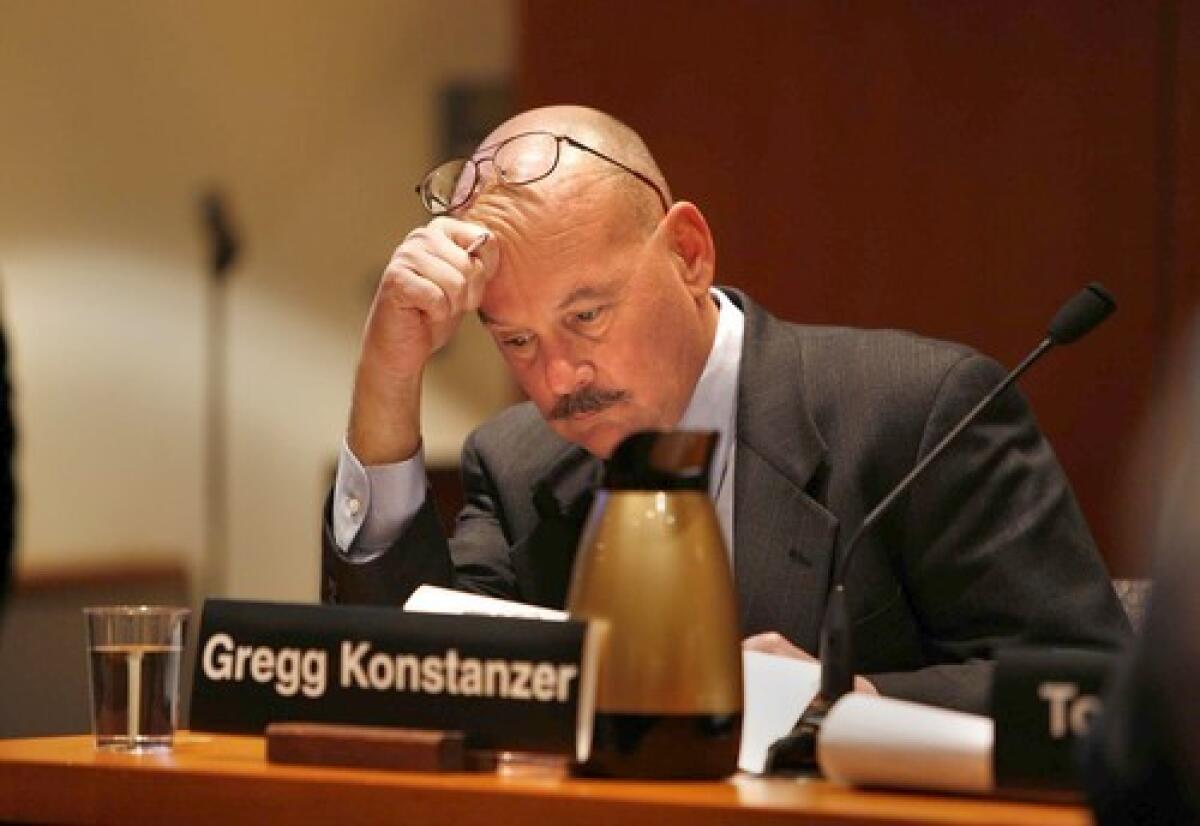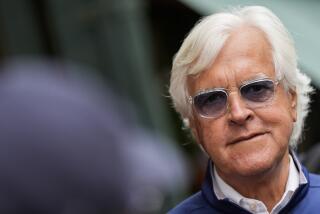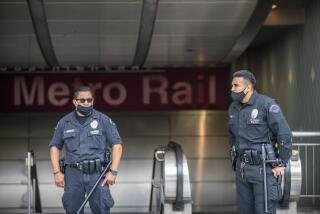Metrolink jettisons 2 managers

- Share via
Two top managers who supervised the train engineer suspected of causing last year’s Chatsworth rail crash were ordered off the Metrolink system Thursday after disclosures of repeated and serious safety violations.
The managers work for Connex Railroad, which holds a contract to provide train crews to the five-county commuter rail agency. The action by Metrolink came after both men testified this week before a National Transportation Safety Board investigation panel about their efforts -- and challenges -- in enforcing safety rules among engineers and conductors.
FOR THE RECORD:
Rail accident cap: An article in Friday’s Section A about Metrolink asking a subcontractor to remove two train crew supervisors said Congress had set a $250-million cap on compensation awards for individual rail accidents. The cap is $200 million. —
“Metrolink’s first priority is the safety of our passengers. The disturbing revelations of misconduct by a Connex employee and the subsequent testimony by Connex’s top managers before an NTSB investigator was dealt with immediately,” said Metrolink Board Chairman Keith Millhouse.
“Simply put, we fired them from Metrolink.”
The agency’s contract allows it to remove Connex employees from duties connected to Metrolink operations. Connex spokeswoman Erica Swerdlow said the men would remain with that company.
Records and testimony released during the two-day Board of Inquiry in Washington detailed how engineer Robert M. Sanchez allowed teenage rail fans to ride in locomotive control cabs. He also sent and received hundreds of text messages while on duty in the days leading up to the Sept. 12 crash, despite having received two warnings that on-the-job cellphone use was a violation of rail policy.
Sanchez was text-messaging again at about the time he sped through a red signal and into a sharp curve of shared, single track in Chatsworth, investigators say. His Metrolink commuter train slammed head-on into a Union Pacific freight train, killing him and 24 passengers and injuring 135, some seriously.
“The unauthorized text-messaging, the ‘ride-alongs’ and other unacceptable behaviors are all a reflection of Connex’s failure to monitor its employees,” said Metrolink board Vice Chairman Richard Katz.
Responding in a statement Thursday evening, Connex said it had complied with a Metrolink request to keep the two men on the contract when it took over operations from Amtrak in 2005. “We will comply with its request to replace them,” the statement said.
“Both gentlemen have had long and distinguished careers at Metrolink, both with Connex and before with Amtrak. Many of the significant safety improvements made at Metrolink since Connex took over the contract in July 2005 are the result of their efforts,” the Connex statement said.
Although agreeing that safety is its first priority, the company said, “We take exception to the allegations made as to their reasons for taking this action, but will not debate it in the same way they have chosen to deliver it.”
The supervisors who were targeted Thursday were Connex General Manager Tom McDonald and Assistant General Manager Gregg Konstanzer. Neither responded to requests for comment.
In his NTSB testimony, McDonald defended his firm’s efforts to enforce safety rules, saying more supervisors had been added and field tests and training have been increased.
But he also said that at times, “There is not a lot we can do. We have 145 [Metrolink] trains operating a day. If an employee is not cooperating, it is difficult.”
In a letter to Connex, Metrolink Chief Executive David Solow delivered the news, citing Sanchez’s text-messaging, two additional red-light violations that occurred within weeks after the Chatsworth crash and an unspecified Federal Railroad Administration citation involving “irregularities” with the firm’s safety testing. He also complained about “obvious dissatisfaction with and hostility toward Connex’s own management personnel by Connex engineers.”
Metrolink’s high-profile response is likely to further strain relations between the rail agency, which had 12 million boardings last year, and its most important contractor, which is paid about $22 million a year.
The tensions are building at the very time that both parties are trying to implement an ambitious list of reforms, including placing video cameras in locomotives, increasing oversight of engineers and conductors, and scrutinizing voluminous rules and operating practices for safety gaps.
The Metrolink board already has asked its staff to examine options for terminating the contract when it comes up for renewal in 2010. And the two are battling in court over rapidly escalating legal fees and liability for the Chatsworth crash. Multiple lawsuits have been filed on behalf of victims and their families. Legal experts say the cases could test a $250-million total liability cap that Congress placed on individual rail accidents, part of the strategy to keep passenger service financially viable.
More to Read
Inside the business of entertainment
The Wide Shot brings you news, analysis and insights on everything from streaming wars to production — and what it all means for the future.
You may occasionally receive promotional content from the Los Angeles Times.
![Irvine, CA - July 16: Gina Osborn, shown at her home, is the former head of Metro security is suing the agency for firing her after she filed a claim with the Inspector General. Photo taken at her home Tuesday, July 16, 2024. Gina Osborn, a former FBI agent who was the agency's first chief safety officer, "was summarily terminated by [Chief Executive] Stephanie Wiggins," said her attorney, Marc R. Greenberg. Osborn says in claims that she butted heads with Metro's CEO over security as the agency was trying to put a good face on its efforts to clean up crime and loitering. (Allen J. Schaben / Los Angeles Times)](https://ca-times.brightspotcdn.com/dims4/default/c1419ae/2147483647/strip/true/crop/5981x4000+9+0/resize/320x214!/quality/75/?url=https%3A%2F%2Fcalifornia-times-brightspot.s3.amazonaws.com%2F46%2F07%2Fa88ac0b7466895ee4e137839d93c%2F1467168-me-former-metro-security-chief-18-ajs.jpg)









